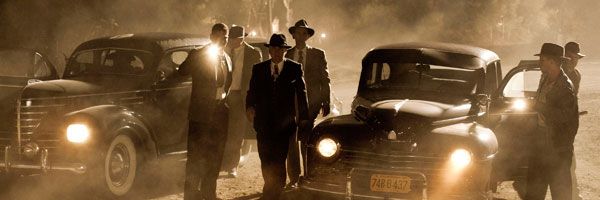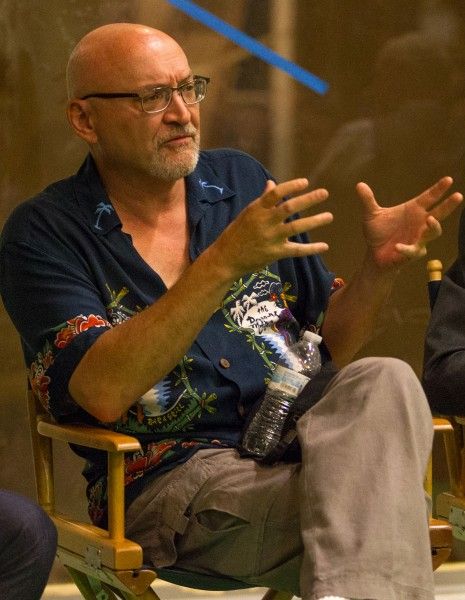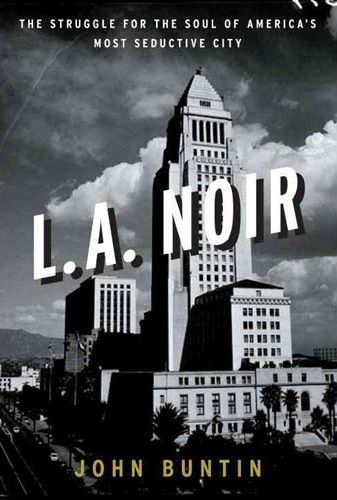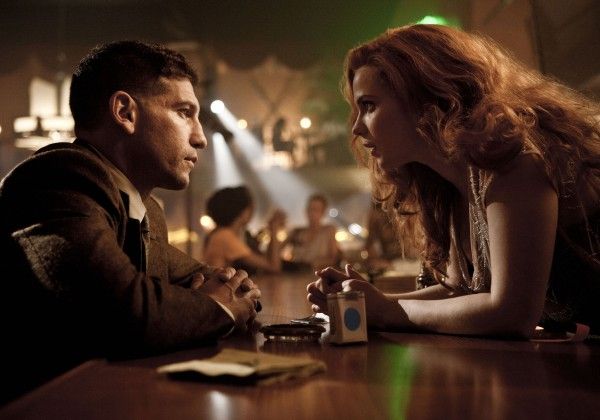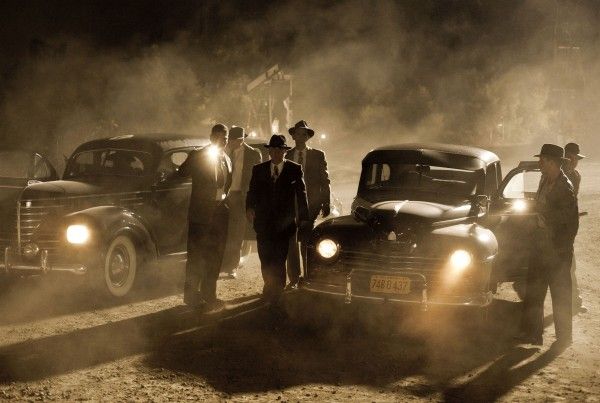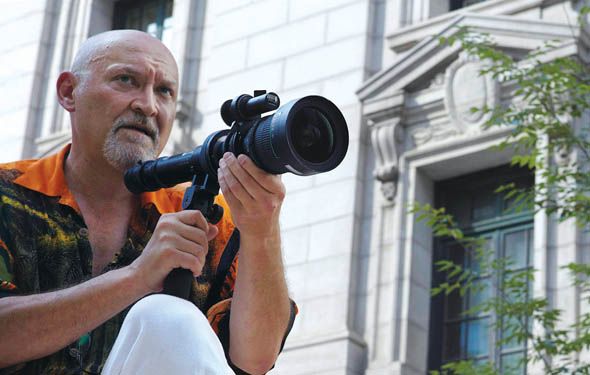As part of the TCA Press Tour, TNT invited members of the press to tour the incredible period sets for their new drama series Lost Angels, at Red Studios in Hollywood, and talk to the cast and creative team behind the show. Based on John Buntin’s acclaimed book L.A. Noir, the story follows the epic battle between a determined police chief and a dangerous mobster, in 1950's Los Angeles. The series stars Jon Bernthal, Jeffrey DeMunn, Neal McDonough, Ed Burns, Gregory Itzin, Robert Knepper, Milo Ventimiglia, Alexa Davalos and Jeremy Luke.
During the interview, show creator/executive producer/writer Frank Darabont and Michael Wright – President and Head of Programming for TNT, TBS and TCM – spoke about how much of the story is real versus how much is fictional, how hard it was to have to rename the show, that the six-episode first season is only scratching the surface of the stories they can tell, what makes L.A. in the ‘50s so fascinating, whether female audiences will connect to such a male-heavy cast, just how dark this show can get, possible future seasons, and the benefits of shooting with the Red camera. Check out what they had to say after the jump.
Question: What was your reaction to this series, when it was brought to you?
MICHAEL WRIGHT: Lost Angels is the brain child of an incredibly gifted man, named Frank Darabont, who was the creator of The Walking Dead, The Shawshank Redemption and The Green Mile. Lost Angels is the true story of the battle between the LAPD and the mob, as they tried to infiltrate L.A. in the late ‘40s. This is something that Frank pitched about a year and a half ago, and was a story that, as he began telling me, was immediately exciting and engaging. I knew it should be on television, and could not wait to get into it. Frank then set about to put together an incredible team of writers and directors, an incredible crew, and this amazing cast to bring to life this story that was so magnificently pitched. It’s very rare that something manifests on screen, as good or better than it did in the original pitch, and that’s a testament to Frank.
How many of these characters are real and how many are fictional, and what did you use for source material?
FRANK DARABONT: That’s an impossible question to answer. We gave ourselves license here. The source of this very much is a beautiful non-fiction piece of work, that is a lavishly researched and beautifully written book. It’s a reference point. It’s also a jumping off point because I really wanted to live up to the promise of what a noir show would deliver. We wanted to go with the real facts that lend themselves so much to a good, smart, pulpy treatment. So, I gave myself license to part from the book. We are going to be following the framework of reality, but what I found very liberating was to say, “Let’s invent the history that’s underneath the history.” There’s a tremendous amount of invention that we’ve brought to this, and that’s very freeing. I grew up with these movies and reading Raymond Chandler. I always wanted the prolific noir hero. Every great noir hero gets the shit beat out of him, progressively, as the story goes on. The beatings just get worse. And we’re adhering to those rules. It’s been wonderful, working with the writers and inventing the stories inside the stories. It’s been a real pleasure. I didn’t want to be constrained because I thought I could do a very straightforward adaptation of this book, that I felt was a very earnest and well-meaning approach to what is actually a very pulpy, heated, sexy, violent world.
How hard did you fight to keep the L.A. Noir title?
DARABONT: We both fought very hard to keep that title.
WRIGHT: It was just not available. The simple answer is that we would love to have had that title. It was just very simply one of those things where the lawyers tell you what you can and can’t do.
So, how hard was it to come up with Lost Angels?
DARABONT: The title is still in play. It might be something else. The title of the show may be Joe Teague Gets the Shit Beat Out of Him In Every Episode, by the time we’re done.
Do these six episodes hit all of the notes of L.A. Noir that you want to hit, or are you just scratching the surface of the book?
DARABONT: I think we’re just scratching the surface of the potential that we can draw from the book.
WRIGHT: It’s a rich, layered tapestry that’s the opening to a much broader, deeper story. The beautiful thing about serialized drama is that the further you go, the deeper you go.
What is it that makes L.A. in the ‘50s so fascinating that you wanted to make a show about it?
DARABONT: The underbelly of Los Angeles, in that era, is very attractive and very sexy. Post-war, when L.A. was expanding, the mob wanted to get in here and control it. Corruption in the police department was so rampant that more cops were on the mob payrolls back then than not. What's not to love about that? It’s Hollywood. We’ve got all of Hollywood unfolding. There is the brain of the studios, at that time, and how did that tied in with the mob. I could go on and on.
What are your favorite L.A. noir movies?
DARABONT: Well, if you’re talking top quality, there’s Sunset Boulevard. In the modern era, I’m a big advocate of True Confessions. Boy, do I love that movie. That is a really great film.
How did you end up working with both Jon Bernthal and Jeffrey DeMunn again?
DARABONT: For me, it’s as simple as, I love these actors. I always want to work with them. And I had two roles in mind for them for a show, and god bless them for saying yes.
Frank, were there things you learned from The Walking Dead, in terms of storytelling for the medium of television, that you applied when scripting this?
DARABONT: No, not particularly. But, the truth is that I’m still learning. It’s all a learning curve. Every time you sit down, with any given episode of any given show, it is a learning curve. You’re learning something new about how to tell a story. But then, I’ve felt that way about everything I’ve ever done – television, features or whatever. Directing or writing, it always feels like the first day of school to me.
This show has a very male-heavy cast. Will female audiences be able to connect with the show?
DARABONT: I’ve discovered that women really like seeing men, especially good, tough, sexy guys.
WRIGHT: I think if we do our job and get people there to sample it, then we can get them back. With this job, you never know. I think this is so character rich. It’s violent and it’s sexy, but at the end of the day, it’s the character evolution, great story, great conflict and great catharsis that brings people back, male or female. That’s what’s driving this. Without giving anything away, there is a fantastic mystery that is established in the pilot, and then it takes you on that road for six hours.
How dark can this show get on TNT?
WRIGHT: As dark as we need to get, to tell the story properly. To be honest, that’s always our approach. We never want to be gratuitous. If it’s germane, you do it. That really is our rule. With this particular series, an audience is coming to it with a vocabulary. They’ve seen the genre done. So, if you’re not authentic, it’s easily dismissed. So, our approach with Frank was, “Whatever you do, be authentic. Don’t be gratuitous, but this is an inherently violent, sexy, pulpy story.” That’s what makes it so rich. It has very high stakes and very big personalities, engaged in genuine life and death conflict. Using that description, you understand why a guy in my job is drawn to this story. So, our job is to say to Frank, “Do what you have to do to make it authentic and interesting.”
DARABONT: What [Michael] actually said to me was, “I want to give my standards and practices people sleepless nights.”
If this is successful, do you want to do more seasons?
WRIGHT: God, I hope so. I think there are certain shows that benefit from a shorter order, whether that’s six, eight or ten. Falling Skies was very successful, so we extended to 12 episodes. I wouldn’t want to go past 12 on that show because it’s so time intensive and complex. A show like this, we’d like to do a few more episodes, but we’re not doing 22. That would be silly.
DARABONT: It’s a period piece. It’s a complicated and challenging show to make. Doing six episodes is a challenge, so we won’t do 20.
Frank, a number of the projects you’ve done have been retrofitted back to black and white. Any chance of doing that with this show?
DARABONT: The thought has certainly crossed our minds. We might actually dabble with it and see. But honestly, I’m loving what we’re shooting so much, and the color palette is so tasty. At the very least it’s always a fun thing on Blu-ray, to see a black and white version, particularly that would be of that period.
WRIGHT: But, it’s so beautifully shot. That would be really cool and something you might see Frank play around with, but the photography is just exquisite.
Frank, at this point in your career, how do you decide what you're going to do?
DARABONT: It’s been the same since the very beginning of my career. I find the thing I’m most excited about, and I walk down that road. That philosophy has served me pretty well.
Even if it doesn’t pay?
DARABONT: At the end of the day, I’m not dipping fries at McDonald’s for minimum wage. Honestly, I have never chased a paycheck. I’m not going to go hungry lose my house. Not to sound Pollyanna about it, but the reason I got into this business was to try to do the best work that I could, and so that’s where my nose takes me. It follows the passion.
What are you doing on the technical side of things, as far as how you’re shooting this show?
DARABONT: Because I love shooting with film, we shot the pilot on Super-16, as I did on The Walking Dead. And then, in the time that passed since we shot the pilot and we were gearing up to do this, every time I approach something, I test the digital world again, and this is going to turn into a plug for the Red camera, but when I tested it, I realized that all of my arguments against it were going away. And I realized that there was nothing left but advantages for it, so we switched, after the pilot. We’ve gone from Super-16 film to digital. I was one of the last hold-outs, but I’ve made the switch over and it’s been a fantastic thing.
Were you able to change the grain of the Super-16?
DARABONT: We’ll get there. There will probably be a little more resolution in the episodes after that. The audience may go, “Lucy, you have some ‘splaining to do.” But when they see the pilot, and when they see the other episodes, I don’t think it's going to be too much of a difference.
Do you see the advantage of the Red camera’s lightness and mobility?
DARABONT: Oh, God, yes! Oh, yeah! Just the fact that you don’t have to reload the Mag film, every ten minutes, is just astonishing. That alone saves me a whole lot of time.

